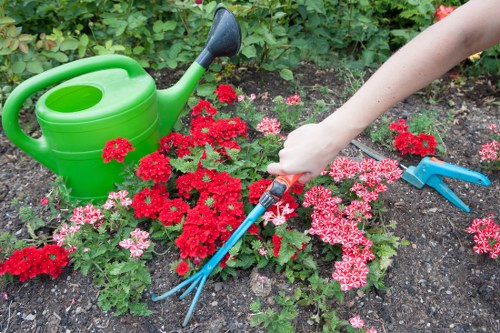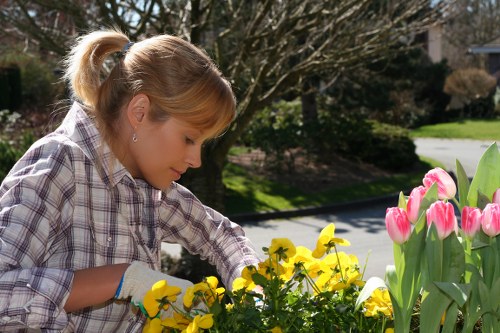Transform Your Outdoor Space with Landscape Gardening in Gipsy Hill

Landscape gardening in Gipsy Hill offers residents the opportunity to enhance their outdoor spaces, creating beautiful and functional gardens that reflect personal style and the unique characteristics of the area. Whether you're looking to redesign your garden, add new features, or simply maintain your current landscape, Gipsy Hill provides a vibrant community with access to professional gardening services and a plethora of inspiration.
The climate in Gipsy Hill is conducive to a wide variety of plants, allowing gardeners to experiment with different flora to create stunning visual appeal throughout the year. From blooming flowers in the spring to lush greenery in the summer, colorful foliage in the autumn, and resilient plants that withstand the cold winter months, there's something for every season.
When planning your landscape garden, it's essential to consider the specific conditions of your property, such as soil type, sunlight exposure, and drainage. Understanding these factors will help you select the right plants and design elements to ensure a thriving and sustainable garden.

Designing Your Dream Garden
Creating a landscape garden in Gipsy Hill starts with a well-thought-out design plan. This plan should outline the key elements you want to include, such as pathways, seating areas, water features, and plantings. A cohesive design not only enhances the aesthetic appeal of your garden but also ensures functionality and ease of maintenance.
Incorporate hardscape elements like patios, decks, and fences to provide structure and define different areas within your garden. These elements can serve as focal points and offer practical benefits, such as providing space for outdoor dining or creating privacy from neighbors.
Consider the use of softscape elements, including a variety of plants, flowers, shrubs, and trees, to add color, texture, and life to your garden. Mixing different plant types and sizes can create depth and interest, making your outdoor space visually appealing from every angle.

Choosing the Right Plants
Selecting the appropriate plants is crucial for the success of your landscape garden. Gipsy Hill's temperate climate is suitable for a diverse range of plants, from native species that thrive naturally to exotic varieties that add unique flair. It's important to choose plants that are well-suited to your garden's conditions to ensure they thrive with minimal maintenance.
Consider the growth habits and mature sizes of plants to avoid overcrowding and ensure that each plant has enough space to reach its full potential. Grouping plants with similar water and sunlight requirements together can simplify care routines and promote healthy growth.
Incorporate plants with varying bloom times to ensure your garden remains vibrant throughout the year. This continuous cycle of color and life helps maintain interest and provides ongoing enjoyment from your outdoor space.

Essential Landscape Features
Integrating key landscape features can elevate your garden, adding both beauty and functionality. Water features, such as ponds, fountains, and waterfalls, create a soothing ambiance and serve as a focal point in your garden design. They also attract wildlife, enhancing the ecosystem of your outdoor space.
Pathways made from stone, gravel, or paving slabs guide visitors through your garden, highlighting different areas and preventing wear on your plantings. Properly designed paths enhance accessibility and make your garden easier to navigate and enjoy.
Seating areas, like benches or pergolas, provide a place to relax and enjoy your garden. These spaces can be strategically placed to offer views of specific garden sections or to create a peaceful retreat away from the everyday hustle.

Sustainable Gardening Practices
Embracing sustainability in your landscape gardening not only benefits the environment but also creates a more resilient and cost-effective garden. Implementing practices such as rainwater harvesting, composting, and using native plants can reduce water usage and minimize the need for fertilizers and pesticides.
Rainwater harvesting involves collecting and storing rainwater for use in your garden. This natural water source is excellent for maintaining healthy plants, especially during dry periods, and reduces reliance on municipal water supplies.
Composting is another sustainable practice that turns organic waste into nutrient-rich soil amendments, enhancing soil fertility and structure. By composting kitchen scraps and garden waste, you can create a closed-loop system that supports plant growth and reduces landfill contributions.

Maintenance Tips for a Thriving Garden
Proper maintenance is essential to keep your landscape garden in Gipsy Hill looking its best year-round. Regular tasks such as watering, pruning, weeding, and fertilizing ensure that your plants remain healthy and vibrant.
Establish a consistent watering schedule that aligns with the specific needs of your plants and the local climate conditions. Using drip irrigation systems or soaker hoses can provide efficient and targeted watering, reducing water waste and promoting deep root growth.
Pruning is vital for maintaining the shape and health of your plants. Remove dead or diseased branches, and trim back overgrown areas to encourage new growth and improve air circulation. Proper pruning techniques help prevent pest infestations and disease spread.

Weeding and Pest Control
Weeds compete with your desirable plants for nutrients, water, and light, so regular weeding is necessary to maintain a healthy garden. Hand-pulling weeds or using weed barriers can effectively reduce their presence without harming your plants.
Pest control is another critical aspect of garden maintenance. Identify common garden pests in Gipsy Hill and implement integrated pest management (IPM) strategies to manage them sustainably. IPM includes using biological controls, such as beneficial insects, and employing mechanical methods like traps and barriers to minimize pest damage.
Encourage natural predators in your garden, such as birds and ladybugs, by providing habitats like birdhouses and insect-friendly plants. This approach promotes a balanced ecosystem, reducing the need for chemical pesticides.

Seasonal Gardening in Gipsy Hill
Adapting your gardening practices to the changing seasons ensures continuous growth and beauty throughout the year. Each season in Gipsy Hill brings unique opportunities and challenges that can be addressed with proper planning and care.
In the spring, focus on planting new flowers and vegetables, as well as preparing garden beds by enriching the soil with compost and mulch. Spring is also an ideal time to prune deciduous trees and shrubs, promoting healthy growth for the upcoming year.
Summer gardening requires regular watering and monitoring for heat stress. Implementing shade structures or mulching can help retain moisture and protect plants from intense sunlight. Pruning flowering plants after they bloom encourages more blossoms and maintains plant shape.

Autumn and Winter Care
As autumn approaches, prepare your garden for the colder months by clearing fallen leaves, protecting sensitive plants with mulch, and harvesting remaining vegetables. Planting cover crops can improve soil health and prevent erosion during the winter.
Winter gardening involves selecting hardy plants that can withstand frost and snow. Incorporate evergreen shrubs and perennials that provide year-round interest, as well as structures like bird feeders and shelters to support local wildlife during the colder months.
Regularly check for any plant damage caused by harsh weather and take corrective measures to ensure your garden remains in good condition. This proactive approach helps minimize winter damage and sets the stage for a vibrant spring.

Enhancing Your Garden with Lighting
Proper lighting can transform your garden, extending its usability into the evening and highlighting key features. Landscape lighting enhances the beauty of plants, pathways, and architectural elements, creating a magical atmosphere after dark.
There are various types of garden lighting to consider, including ambient lighting for general illumination, task lighting for specific areas like patios or seating areas, and accent lighting to focus on particular plants or structures. Solar-powered lights are an eco-friendly option that reduces energy consumption while providing effective lighting.
Strategically placing lights along pathways ensures safety and guides visitors through your garden. Subtle uplighting can emphasize trees and shrubs, while downlighting can create dramatic shadows and depth. Combining different lighting techniques adds dimension and interest to your outdoor space.

Choosing the Right Lighting Fixtures
Selecting appropriate lighting fixtures is crucial for achieving the desired effect in your garden. Fixtures come in various styles and materials, allowing you to match the lighting to your garden's aesthetic. Stainless steel, brass, and durable plastics are popular choices for their longevity and weather resistance.
Consider the placement and spacing of your lights to ensure even coverage and prevent glare. Using dimmable fixtures or installing timers can give you greater control over the lighting intensity and duration, enhancing both functionality and ambiance.
Incorporate LED lights for energy efficiency and longevity, as they consume less power and have a longer lifespan compared to traditional bulbs. LED fixtures also produce less heat, making them safer for prolonged outdoor use.

Integrating Sustainable Materials
Using sustainable materials in your landscape garden contributes to environmental conservation and creates a timeless, eco-friendly space. Opt for recycled or locally sourced materials for hardscape elements like paving, decking, and fencing to reduce your garden's carbon footprint.
Bamboo, reclaimed wood, and natural stone are excellent choices for building garden structures such as pergolas, benches, and raised beds. These materials are not only sustainable but also add a unique and organic look to your garden design.
Incorporate permeable paving solutions to enhance water management and reduce runoff. Permeable pavers allow rainwater to infiltrate the soil, replenishing groundwater supplies and minimizing the risk of flooding during heavy rains.

Eco-Friendly Practices
Implementing eco-friendly practices in your landscape gardening routines helps promote a healthier environment and sustainable living. Reducing chemical use, conserving water, and maintaining biodiversity are key components of an eco-friendly garden.
Minimize the use of chemical fertilizers and pesticides by opting for organic alternatives and natural pest control methods. This approach protects beneficial insects, improves soil health, and ensures that your garden is safe for children and pets.
Encourage biodiversity by planting a variety of species that support different wildlife, including pollinators like bees and butterflies. Creating habitats through birdhouses, insect hotels, and native plantings fosters a balanced ecosystem within your garden.

Professional Landscape Services in Gipsy Hill
For those seeking expert assistance, numerous professional landscape gardening services in Gipsy Hill can help bring your vision to life. These professionals offer a range of services, from initial design and planning to installation and ongoing maintenance, ensuring your garden remains beautiful and functional.
Collaborating with a landscape professional allows you to benefit from their expertise in plant selection, design principles, and sustainable practices. They can provide tailored solutions that cater to your specific needs and preferences, transforming your outdoor space into a personalized haven.
Professional services often include consultations, where experts assess your garden's current state and discuss your goals. This collaborative approach ensures that the final design aligns with your expectations and maximizes the potential of your property.

Choosing the Right Landscape Gardener
Selecting the right landscape gardener is essential for achieving the desired results. When evaluating potential professionals, consider their portfolio of past projects, client testimonials, and expertise in various gardening styles. A reputable landscaper will have a track record of creating beautiful and sustainable gardens tailored to their clients' needs.
Ensure that the landscape gardener you choose is familiar with the local climate and plant species in Gipsy Hill. Their local knowledge can be invaluable in selecting plants that thrive in the area's conditions and in implementing practices that suit the regional environment.
Discuss your budget and timeline upfront to ensure that the landscaper can meet your expectations without compromising on quality. Transparent communication and clear agreements help foster a positive working relationship and successful project outcomes.

Maximizing Small Garden Spaces
Even if you have a limited outdoor area, landscape gardening in Gipsy Hill can create a lush and inviting space. Maximizing small garden spaces involves strategic planning and creative design to make the most of every inch.
Use vertical gardening techniques, such as trellises, wall-mounted planters, and hanging baskets, to add greenery without taking up valuable ground space. Vertical elements can also serve as focal points, drawing the eye upward and creating a sense of height and depth.
Choose compact and multi-functional furniture that provides seating without overwhelming the space. Folding chairs, benches with built-in storage, and modular pieces can be easily rearranged to suit different occasions and needs.

Smart Plant Choices for Small Gardens
Selecting the right plants is crucial for small garden spaces. Opt for compact varieties that fit well within limited areas while still providing visual interest and greenery. Dwarf shrubs, petite perennials, and ornamental grasses are excellent choices for small gardens.
Use container gardening to grow plants in pots, which can be moved and rearranged as needed. This flexibility allows you to change the look of your garden easily and experiment with different plant combinations without committing to a fixed layout.
Incorporate mirror-like surfaces or light-colored elements to create the illusion of more space. Reflective surfaces can amplify natural light and make your garden appear larger and more open.

Enhancing Privacy in Your Garden
Creating a private sanctuary in Gipsy Hill's landscape garden allows you to enjoy your outdoor space without disturbances. There are several strategies to enhance privacy, from planting dense hedges to installing fencing and using natural barriers.
Planting evergreen trees and shrubs along the boundaries of your garden provides year-round privacy and a natural barrier against noise and prying eyes. Species like arborvitae, boxwood, and holly are excellent for creating dense, lush screens.
Incorporate structures like pergolas, trellises, and fences to define your garden boundaries while adding architectural interest. These elements can be adorned with climbing plants, such as ivy or wisteria, to further enhance privacy and create a green, inviting backdrop.

Using Natural Barriers
Natural barriers, such as rock formations, water features, and dense plantings, can effectively block unwanted views and create a sense of seclusion in your garden. These elements blend seamlessly with the environment, providing privacy without the starkness of man-made structures.
Strategically placed rocks and boulders can serve as visual barriers and add texture and interest to your garden layout. Combining rocks with plantings can create a natural, harmonious look that enhances both privacy and aesthetic appeal.
Water features like ponds or streams not only provide a tranquil atmosphere but also act as sound barriers, masking external noises and creating a peaceful retreat within your garden.

Incorporating Art and Sculpture
Adding art and sculpture to your landscape garden in Gipsy Hill infuses personality and creativity into your outdoor space. These elements can serve as focal points, spark conversations, and reflect your individual taste and style.
Garden sculptures come in various materials and styles, from contemporary pieces to classic statues. Choose artworks that complement the overall design of your garden and resonate with your personal aesthetic.
Incorporate functional art, such as decorative benches, artistic planters, and unique garden ornaments, to enhance both the beauty and functionality of your garden. These elements add layers of interest and provide practical uses while maintaining artistic integrity.

Lighting Art and Sculptures
Highlighting art and sculpture with strategic lighting enhances their visual impact and creates an enchanting nighttime garden experience. Use spotlights, uplights, and accent lights to draw attention to specific pieces and create dramatic shadows and highlights.
Solar-powered lights are an eco-friendly option that can be easily placed around artworks without the need for electrical wiring. These lights automatically charge during the day and illuminate your sculptures at night, providing both functionality and beauty.
Experiment with different lighting angles and intensities to achieve the desired effect, whether it's subtle illumination or bold spotlighting. Proper lighting enhances the texture and details of your art pieces, making them stand out as integral elements of your garden design.

Creating Outdoor Living Spaces
Transforming part of your garden into an outdoor living space extends your home's living areas and provides a comfortable environment for relaxation, entertainment, and socializing. Outdoor living spaces in Gipsy Hill can range from simple seating areas to fully equipped kitchens and dining zones.
Incorporate comfortable furniture, such as weather-resistant sofas, chairs, and tables, to create inviting spaces for lounging and gatherings. Adding cushions and outdoor rugs enhances comfort and adds a touch of style to your setup.
Install amenities like outdoor kitchens, fire pits, or BBQ areas to increase the functionality of your living space. These features allow you to enjoy outdoor cooking and dining, making your garden a versatile extension of your home.

Choosing the Right Furniture
Selecting durable and stylish outdoor furniture is essential for creating a functional and aesthetically pleasing living space. Opt for materials that can withstand the elements, such as treated wood, metal, and high-quality plastics, to ensure longevity and ease of maintenance.
Consider the size and layout of your garden when choosing furniture pieces. Compact and modular furniture allows for flexible arrangements, making it easier to adapt the space for different occasions and needs.
Add decorative elements like throw pillows, blankets, and outdoor lighting to personalize your living area and create a cozy, welcoming atmosphere. These touches enhance comfort and make your outdoor space more enjoyable during various seasons.

Incorporating Technology in Your Garden
Integrating technology into your landscape garden can enhance convenience, security, and the overall enjoyment of your outdoor space. Modern garden technology offers a range of solutions that blend seamlessly with the natural environment.
Automated irrigation systems ensure your plants receive consistent and appropriate watering, reducing the time and effort required for manual watering. Smart controllers can adjust watering schedules based on weather conditions, promoting efficient water use and healthier plants.
Outdoor speakers and smart lighting systems allow you to create the perfect ambiance with music and customizable lighting settings. These technologies make your garden more interactive and enjoyable, providing a modern touch to your traditional landscape design.

Smart Irrigation Solutions
Smart irrigation systems use sensors and weather data to optimize watering schedules, conserving water while maintaining healthy plant growth. These systems can be controlled remotely via smartphone apps, allowing you to adjust settings on the go.
Drip irrigation and soaker hoses are effective methods for delivering water directly to the plant roots, minimizing evaporation and runoff. These techniques ensure that water is used efficiently, reducing waste and promoting deep root development.
Rain sensors can be integrated into your irrigation system to automatically pause watering during rainy periods, further conserving water and preventing over-watering of your plants.

Final Thoughts on Landscape Gardening in Gipsy Hill
Landscape gardening in Gipsy Hill offers endless possibilities for creating a personalized and beautiful outdoor space. By thoughtfully designing your garden, selecting the right plants, and incorporating essential features, you can transform your property into a serene retreat that enhances your home's aesthetic and provides a haven for relaxation and enjoyment.
Embracing sustainable practices and integrating modern technologies not only benefits the environment but also ensures that your garden remains healthy and vibrant for years to come. Whether you're starting from scratch or looking to revitalize your existing garden, the resources and expertise available in Gipsy Hill make it an ideal location to pursue your landscape gardening dreams.
Ready to transform your garden? Contact us today to book your landscape gardening service in Gipsy Hill and start creating the outdoor space you've always envisioned.